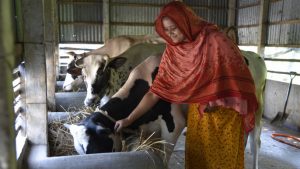China’s milk industry, marred in years past by quality issues such as the 2008 melamine scandal, has a domestic champion that is on track to become the world’s biggest milk company: Inner Mongolia Yili Industrial Group 伊利集团.
In 2021 Yili achieved an historic breakthrough, becoming the first domestic dairy producer to breach the 100 billion yuan revenue level, announcing revenues of 110.59 billion yuan ($16.67 billion), a year-on-year increase of 14.15%; and net profits of 8.70 billion yuan, a year-on-year increase of 22.98%. (Yili’s closest competitor, Mengniu Dairy 蒙牛集团, reported revenues of 74.08 billion or $11.17 billion in 2021.)
- Yili is now the domestic leader in retail sales of infant formula milk powder, liquid dairy products, and cold beverages.
- An Yili JV, China Youran Dairy Group 中国优然牧业集, is the world’s largest supplier of raw milk with 416,000 cows in stock.
- In 2017, Yili beat out Mengniu to become the official supplier of dairy products for the 2022 Winter Olympics, making it the first dairy company to partner with both the winter and summer Olympics.
- In the 26 years since its public listing, Yili’s market capitalization has risen from 421 million yuan ($63.47 million) in 1996 to 243.8 billion yuan ($36.76 billion) in 2022, a cumulative increase of 593 times, and an annualized increase of 27.84%.
- Yili has demonstrated its willingness to follow government directives: In April, it became the first company in China’s food industry to release “double carbon” roadmaps, and expects to become carbon neutral by 2050.
In the first quarter of this year, Yili continued to prosper, reporting revenues of 30.9 billion yuan ($4.65 billion), an increase of 13.41% year-on-year; and net profits of 3.5 billion yuan ($527.73 million), an increase of 24.32% year-on-year. In 2022, the company expects to break through the 10 billion yuan profit level.
The context
According to the National Bureau of Statistics (NBS), annual per capita consumption of milk in China is still less than 25kg (55 lbs), far behind the global average of 113kg (250 lbs).
This might be an indication of the potential for further growth in the domestic market, but the domestic dairy industry, worth about 633 billion yuan ($95.44 billion) in 2019, only increased by 0.87% year-on-year in 2020, and growth may well be plateauing. Moreover, the milk industry depends on large industry assets, a long production chain, and high investment in R&D; and (again according to NBS data) in recent years domestic milk producers have increased their revenues but not seen a corresponding increase in profits.
The takeaway
Nevertheless, Yili breaking through the 100 billion yuan level may be the beginning of a new era of global expansion.
- A ranking of global dairy companies produced by Rabobank in 2021 placed Yili in the top five in 2020, along with Lactalis (France), Nestlé (Switzerland), Dairy Farmers of America (U.S.), and Danone (France).
- Yili has now set itself the task of entering the top three global producers: The company’s revenues in 2021 ranked fourth behind Lactalis ($23 billion), Nestlé ($20.8 billion), and Dairy Farmers of America ($19 billion).
The next challenge for Yili is to increase production efficiency and R&D investment, expand foreign markets (Yili already sells its products in 60 countries), make foreign acquisitions, and reduce costs.













